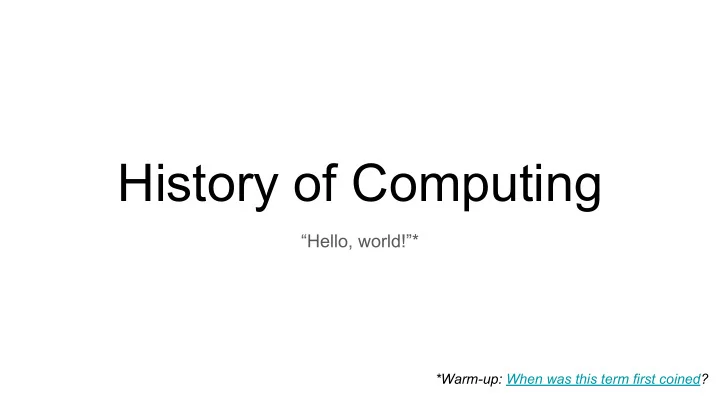

History of Computing “Hello, world!”* *Warm-up: When was this term first coined?
Welcome to CSE 490H! Melissa Hovik ● BS/MS Student ● TA/instructor in Allen School for various courses including CSE 143/154/311/332/341 ● Many interests, especially exploring the exciting history of computer science! Remy Wang ● Grad student studying programming languages in PLSE lab ● Interests in PL, game theory, and of course, the exciting history of computer science!
Overview of CSE 490H ● Course website here: https://courses.cs.washington.edu/courses/cse490h1/19wi/
A Few “First Things First” Logistics ● We’re scheduling a field trip to Living Computer Museum! ○ Option 1: Thursday leaving at 2:30PM, arrive back to campus around 4:30PM ○ Option 2: Saturday leaving at 1PM, arrive back around 3:30PM
What This Seminar Is About ● Explore the origins of computer science - beyond the first computer! ● Draw connections to other CS courses you are taking ● Hear from domain experts about case studies, milestones, innovations, etc. ● Read a few pioneering papers on different innovations/ideas in computing ● Take advantage of discussions with guest speakers and your peers! ● This is the first time we’ve offered the seminar - let us know what is/isn’t working over the weeks!
Why are you taking this seminar?
What do you know about HOC so far? Warm-up activity! (See website for key)
Why is it important to study the history of computing? ● Innovations in computing have dramatically shaped the way the world works today ● We continue to come across challenges in technology (societal, economical, ethical, etc.) ● Important to reflect on the past to inform decisions and policies implemented today ● Provide context to CS foundations in your current courses ● Inform decisions for your future contribution s in the field ● Generally really interesting :)
What drives the history of computing? ● Ideas? ● Inventions? ● People? Companies? Governments? ● Wars? ● Courses on HOC vary greatly ○ Some focus on linear timelines ○ Some start before the 1800’s, some in 1950 ○ We’ll focus on particular topics with some exciting guest speakers (and a field trip!)
How to study the history of computing? ● Each weekly topic has 1-2 recommended readings ● We will add an optional collaborative Google Doc for each reading and you can add your own questions/discussion questions/thoughts to discuss with peers/us/speakers ● Take advantage of weekly lectures/discussions! ● We also will be building onto a resources page over the quarter
When Did Computers Begin? ● Early innovations in computing driven by calculators to aid scientific research and growing economies ○ First mechanical calculator invented by Blaise Pascal in 1642 ● As populations grew, need to store/analyze data also grew ● Start of “Computer Age” considered to be 1950’s shortly after Turing’s paper proposing design of computer with circuit diagrams ● 1950’s saw lots of electronic computers created between US and UK ○ EDSAC ○ ENIAC ○ UNIVAC ● Computers continued to become more accessible to public, software development tries to catch up with
Themes in History of Computing ● Role of data ○ E.g. 1890 census collection motivated first electromechanical calculator invented by Herman Hollerith, who would help establish Computer-Tabular-Recording Company, later renamed to IBM ● Societal, economical, and political contexts ● Does technology drive society, or does society drive technology? ● Influence of wartime conflict on scientific and technological innovation (arms race) ● Research vs. industry vs. government ○ Economic competition and government pressure highly influential in 1950-80’s
Key Innovations: Pre-1900’s ● First mechanical calculator invented by Blaise Pascal in 1642 ● Difference Engine and Analytical Engine in early 1800’s (first “computing” machines) ● First “program” written by Ada Countess of Lovelace for Analytical Engine to calculate the 8th Bernoulli number ● Boolean algebra created in 1850’s (fundamental in computer science)
Key Innovations: 1950-80’s ● Bell Labs ○ Source of much research in CS and shaped modern computers ○ Unix created in 1970 by Dennis Richie and Ken Thompson ● Hardware: ○ Transistors invented in 1947 at Bell Labs ○ Moore’s Law published in 1965 by co-founder of Intel ● Theory/cryptography ○ RSA invented in 1977 ● Networking ○ ARPANET started in 1968, Internet invented by Vint Cerf in 1970’s
Key Innovations: 1950-80’s ● First electronic computers/operating systems ○ ENIAC/UNIVAC ○ Unix in 1970 ○ Personal computers in 1970’s (PDP-11 on the right) ● First programming languages: ○ COBOL created by Grace Hopper in 1953 ○ FORTRAN in 1950’s ○ ALGOL/LISP in ~1960 ○ C in 1972 ○ BASIC in 1974
Key Innovations: 1950-80’s ● Software Development Practices ○ General era of SW bugs and councils/policies created as a result ○ Art of Computer Programming first released in 1962 by Donald Knuth ● HCI ○ First computer mouse invented in 1968 ○ GUI’s become more prevalent with newer Windows computers ○ Microsoft Word created in 1983 ● UW CSE! ○ Started in 1967 for graduates, 1975 for undergrads ○ In 1970, only 7 faculty ○ Ladner Theorem in 1975
Authorization of UW CSE Program Source: http://lazowska.cs.washington.edu/history/Board_of_Regents_Minutes_March_1967.pdf
Key Innovations: 1980’s-2000’s ● Digital Information ○ Internet continued to become public-facing ○ First online newspaper in 1980 (the Columbus Dispatch) ● World Wide Web ■ Invented by Tim Berners-Lee (1990) ■ FIrst graphical web browser (Netscape) released in 1994 ● Search Engine ○ “Archie” invented in 1990 ○ Yahoo and Google founded in 1995
Key Innovations: 1980’s-2000’s ● Start of online economies ○ Amazon.com founded in 1994 by Jeff Bezos ○ Ebay.com founded in 1998 ● Many, many more programming languages ○ BASH in 1989 ○ Python in 1989 ○ Java in 1996
Key Innovations: 21st Century What do you think are the key innovations of the 21st century so far?
Next Week: History of Game Theory (with games!) ● Our first topic will be the history of game theory - please review the posted readings before Tuesday!
Recommend
More recommend